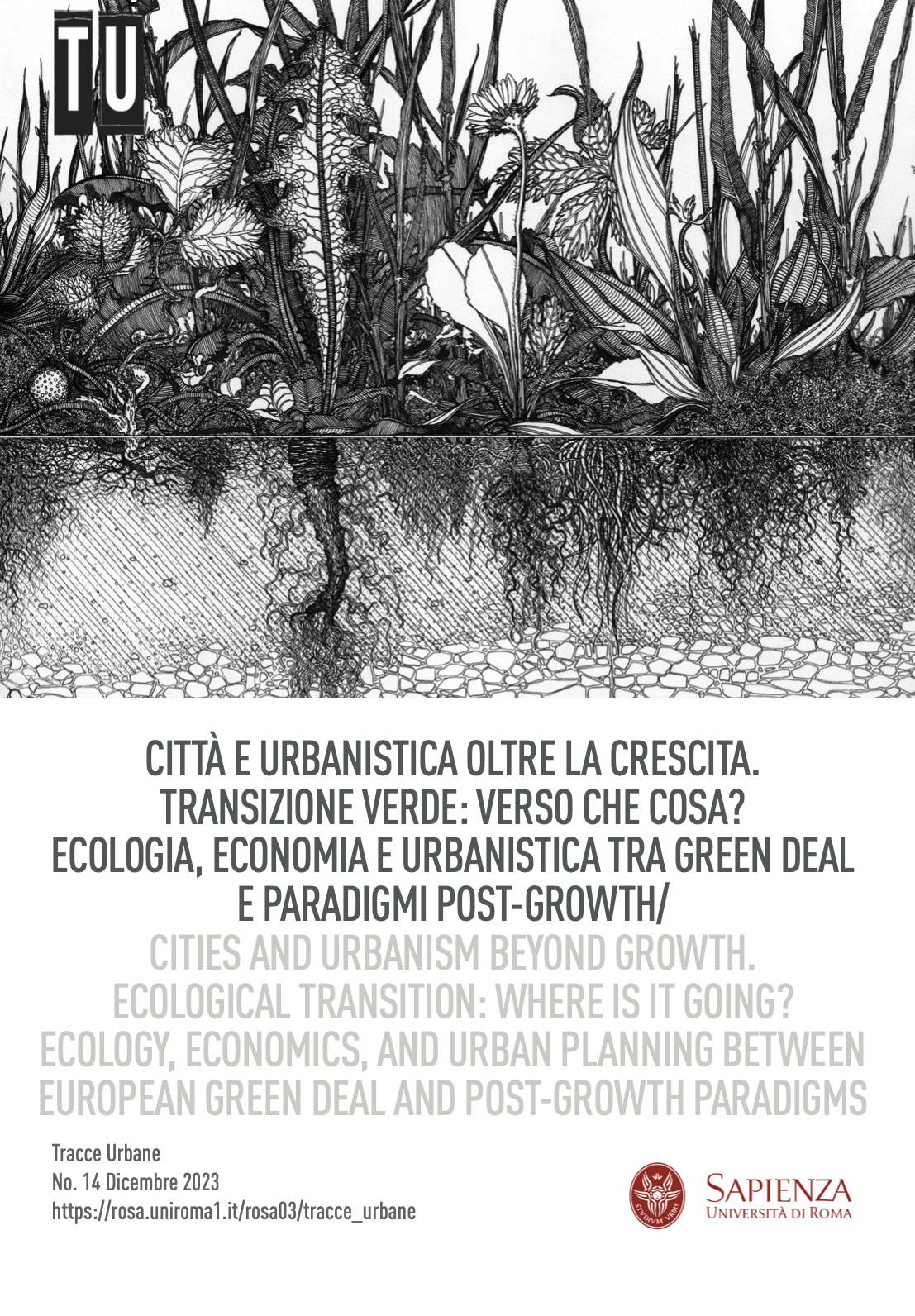Genealogies and evolutions of the ecological thread in urbanism and spatial planning in a post-growth perspective
DOI:
https://doi.org/10.13133/2532-6562/18517Keywords:
Ecological transition, urban metabolism, ecopolitan planning, ecopolitan urbanismAbstract
In the face of the demands urged by climate change and socio-ecological transition, the article reconstructs how in the last century ecological thinking has traversed urbanism with projects and models called upon to bridge the city-countryside and society-nature opposition. This exploration, generically chronological, does not follow a systematic method of historical-disciplinary analysis. Rather, the aim is to trace the various strands of thought that, directly or indirectly, have addressed the issue of the ecological dimension in the theory and practice of human settlement planning and design. This discussion aims at tracing a genealogy of multidisciplinary proposals that have been oriented towards dynamics other than those that are merely expansive, of accumulation or revenue, or have taken them into account and attempted to counterbalance their effects. The final aim is to provide some elements for a renewed contribution of urbanism to the critical debate currently underway on the future of urbanised territories in a post-growth perspective.
References
Babalis D. (2007). Ecopolis: Revealing and enhanging sustainable design. Firenze: Alinea.
Brenner N., Schmidt C. (2014). «Planetary Urbanization». In: Brenner, N., ed., Implosions/Explosion: Towards a Study of Planetary Urbanization. Berlin: Jovis.
Charlesworth E., Adams R. (2013). The EcoEdge: Urgent Design Challenges in Building Sustainable Cities. London-New York: Routledge.
Club of Rome, Meadows D.H., Meadows D.L., Randers J., Behrens W.W.III, eds., (1972). The Limits to Growth: A Report for the Club of Rome’s Project on the Predicament of Mankind. New York: Universe Books.
Cooper L., Baer H.A. (2019). Urban Eco-Communities in Australia. Real Utopian Responses to the Ecological Crisis or Niche Markets? Singapore: Springer Singapore.
Corner J. (2014). The Landscape Imagination: Collected Essays of James Corner 1990-2010. Princeton: Princeton Architectural Press.
Downton P. F. (2008). Ecopolis: Architecture and Cities for a Changing Climate. Springer Science & Business Media.
Fuchs-Kittowski K., Krüger P. (1997). «The Noosphere Vision of Pierre Teilhard de Chardin and Vladimir I. Vernadsky in the Perspective of Information and of World-wide Communication». World Futures, 50 (1–4): 757–84. DOI: 10.1080/02604027.1997.9972669.
Fabbro S. (2021). Ecopoli. Visione Regione 2050. Roma: INU Edizioni.
Fabbro S., Faraone C. (2022). «Verso la ‘transizione ecologica’: Ecopoli come visione e modello per il governo del Territorio». Urbanistica Informazioni, 306 (Special Issue Oltre il futuro: emergenze, rischi, sfide, transizioni, opportunità. Atti della XIII Giornata Internazionale di studi Inu): 713-16.
Grulois G., Tosi M.C., Crosas C., eds., (2018). Designing Territorial Metabolism: Barcelona, Brussels, and Venice. Berlin: Jovis.
Kaika M., Keil R., Mandler T., Tzaninis Y., eds, (2023). Turning up the Heat: Urban Political Ecology for a Climate Emergency. Manchester: Manchester University Press.
Ignatieva M. (2002). «Ecopolis – Search for Sustainable Cities in Russia». In: The Sustainable City II: Urban Regeneration and Sustainability, 1034. International Series on Advances in Architecture. Southampton, UK; Boston: WIT Press.
Maretto M. (2012). Ecocities. Il progetto urbano tra morfologia e sostenibilità. Milano: Franco Angeli.
Marot S. (2019) Taking the Country’s Side. Agriculture and Architecture, Vol. 4 del catalogo della mostra The Poetics of Reason. 5th Lisbon Architecture Triennale, Barcelona: Polígrafa ediciones e Lisbon Architecture Triennale.
McHarg I. L. (1969). Design with Nature. Hoboken: Wiley.
McNeill J. R., Engelke P. (2016). The Great Acceleration: An Environmental History of the Anthropocene since 1945. Cambridge, MA: Belknap Press.
Mostafavi M., Doherty G., eds, (2010). Ecological Urbanism. Basel: Lars Müller Publishers.
Odum, E. P., Odum H.T. (1953). Fundamentals of Ecology. Philadelphia: Saunders.
Rapoport E. (2011). Interdisciplinary Perspectives on Urban Metabolism. UCL Environmental Institute Working Paper, Development Planning Unit, London: UCL.
Rapoport E. (2014). «Utopian Visions and Real Estate Dreams: The Eco-City Past, Present and Future». Geography Compas, 8 (2): 137–49. DOI: 10.1111/gec3.12113.
Secchi B. (2011). «La nuova questione urbana: ambiente, mobilità e disuguaglianze sociali», CRIOS, 1: 89–99.
Sieverts T. (1997). Zwischenstadt, Birkhäuser. [tr. in. Sieverts T. (2003) Cities without cities: An Interpretation of the Zwischenstadt. London: Taylor & Francis].
Steiner F. (2011). «Landscape Ecological Urbanism: Origins and Trajectories». Landscape and Urban Planning, Landscape and Urban Planning, 100 (4): 333–37. DOI: 10.1016/j.landurbplan.2011.01.020.
Tornaghi C., Dehaene M. (2020). «The Prefigurative Power of Urban Political Agroecology: Rethinking the Urbanisms of Agroecological Transitions for Food System Transformation». Agroecology and Sustainable Food Systems 44 (5): 594–610. DOI: 10.1080/21683565.2019.1680593.
Viganò P., Cavalieri C. e Barcelloni Corte M., eds, (2018). The Horizontal Metropolis between Urbanism and Urbanization. Cham: Springer International Publishing.
Wachsmuth, D. (2012). «Three Ecologies: Urban Metabolism and the Society-Nature Opposition», The Sociological Quarterly, 53(4), pp. 506–523. DOI: 10.1111/j.1533-8525.2012.01247.x.
Downloads
Published
How to Cite
Issue
Section
License
Copyright (c) 2024 Claudia Faraone

This work is licensed under a Creative Commons Attribution 4.0 International License.
NOTA DI COPYRIGHT
Proposta di licenza Creative Commons
1. Proposta per riviste Open Access
Gli autori che pubblicano su questa rivista accettano le seguenti condizioni:
Gli autori mantengono i diritti sulla loro opera e cedono alla rivista il diritto di prima pubblicazione dell'opera, contemporaneamente licenziata sotto una Licenza Creative Commons - Attribuzione che permette ad altri di condividere l'opera indicando la paternità intellettuale e la prima pubblicazione su questa rivista.
Gli autori possono aderire ad altri accordi di licenza non esclusiva per la distribuzione della versione dell'opera pubblicata (es. depositarla in un archivio istituzionale o pubblicarla in una monografia), a patto di indicare che la prima pubblicazione è avvenuta su questa rivista.
Gli autori possono diffondere la loro opera online (es. in repository istituzionali o nel loro sito web) prima e durante il processo di submission, poiché può portare a scambi produttivi e aumentare le citazioni dell'opera pubblicata (Vedi The Effect of Open Access).


